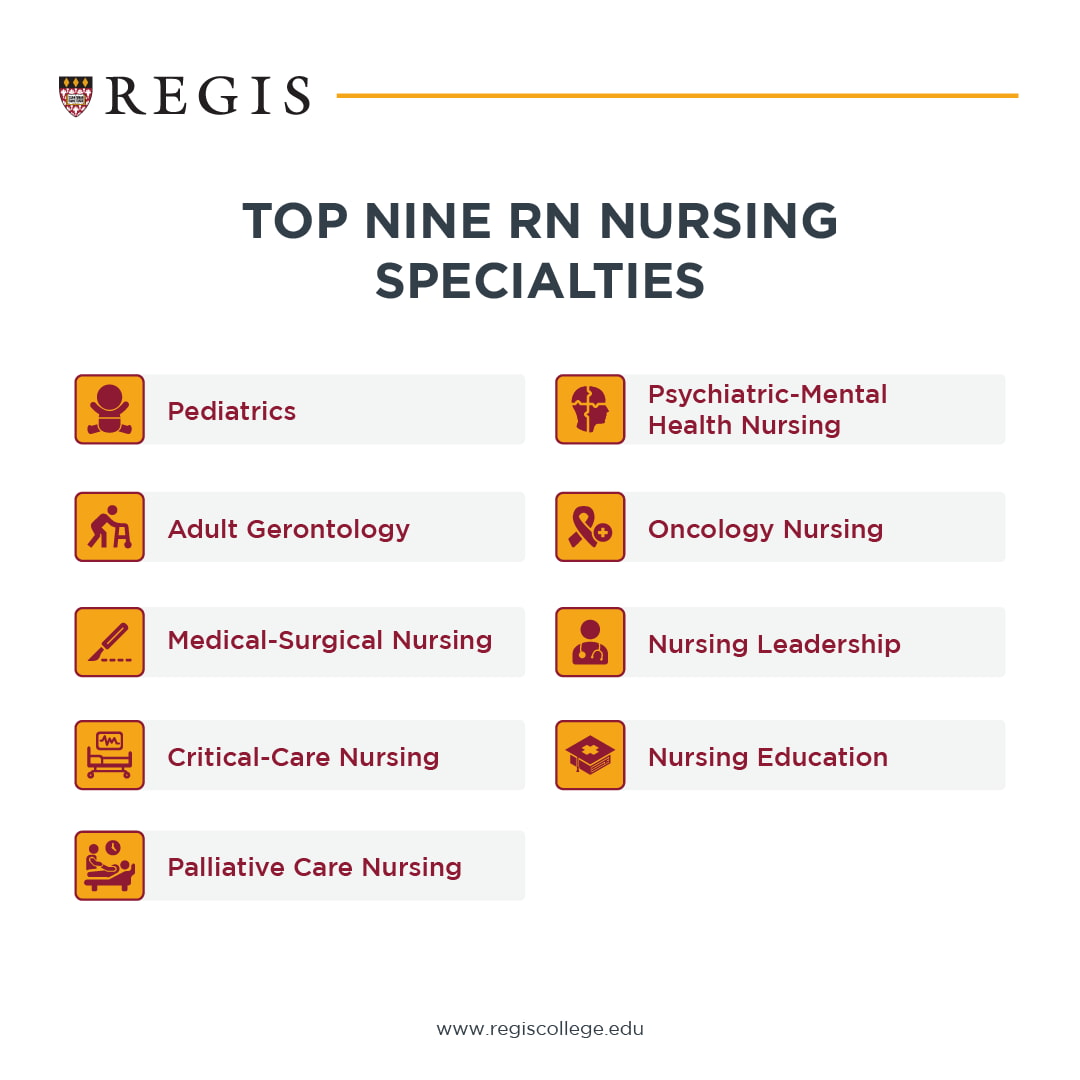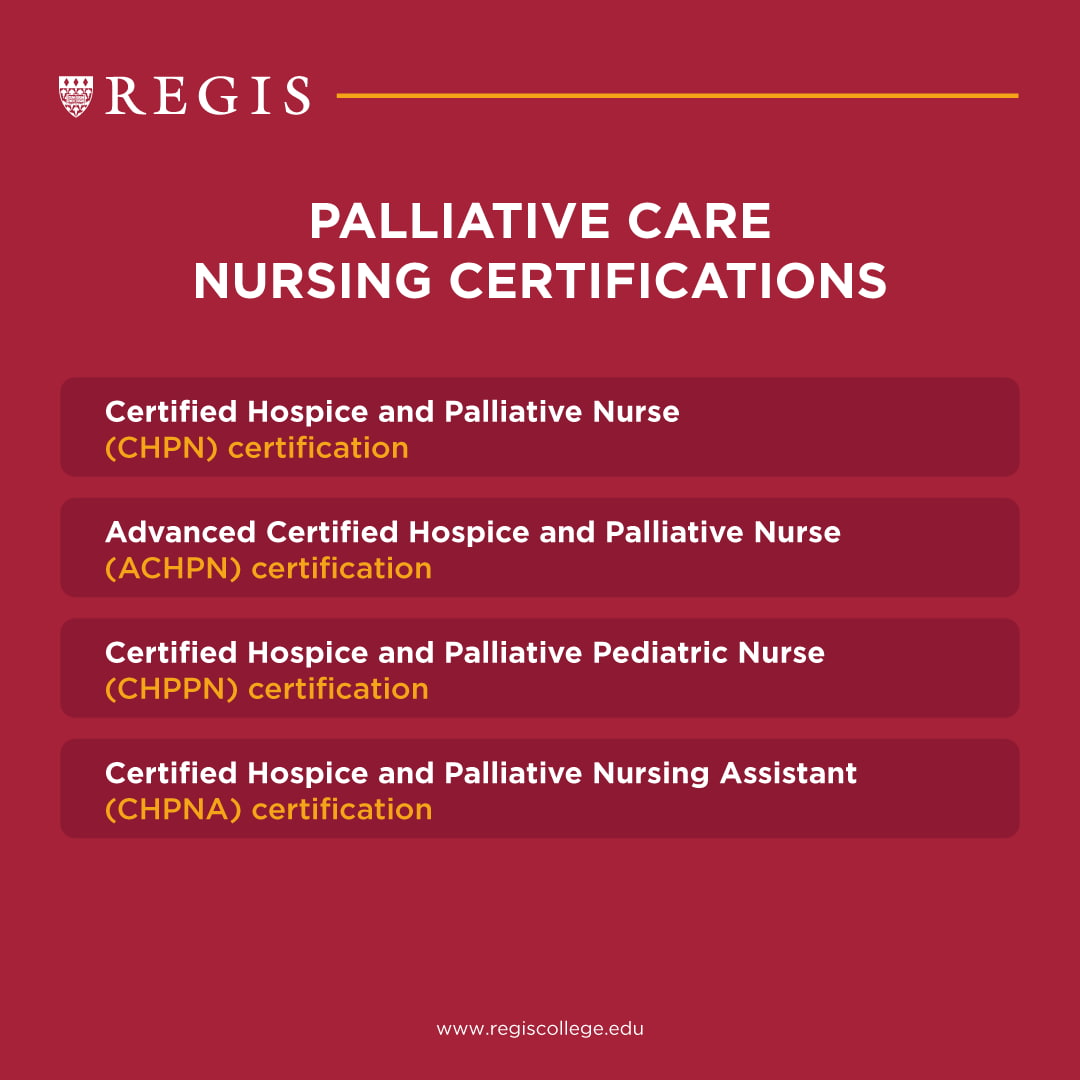Nursing is more than just a career—it’s a dynamic profession with countless opportunities for professionals wanting to make a difference in people’s lives. While some nurses work as generalists and often perform similar tasks and duties, many specialize in areas that align with their passion. That is why, while you can work as a nursing generalist, it’s also possible to specialize in particular areas of nursing that allow you to focus on specific challenges or patient populations.
Many nurses start in one specialty and later transition to another based on their evolving interests.
“I started as a medical surgical nurse, and then I went into critical care,” says Donna Glynn, PhD, RN, ANP, and associate dean of pre-licensure nursing at Regis College, when asked about her own career. “Critical care led me to nurse practitioner practice and then I developed a love of precepting nurse practitioner students, which led me to education. Passions change, but that's the best thing about nursing: You can develop new passions and explore that passion to make your career just more rewarding.”
So whether you begin in medical-surgical nursing, move into critical care, or eventually become a nurse educator, the possibilities are endless.
Key Takeaways
- Nursing specialties such as pediatrics, critical care, oncology, and psychiatric-mental health provide unique career paths tailored to different interests and skill sets.
- Many nurses change specialties throughout their careers, allowing for professional growth and new opportunities in different healthcare settings.
- Obtaining certifications like the Certified Pediatric Nurse (CPN) or Certified Medical-Surgical Registered Nurse (CMSRN) can enhance career prospects and earning potential.
- Advancing in nursing often requires additional, advanced education, which can open doors to leadership and specialized practice roles.
Choosing the right nursing specialty involves considering personal interests, work environment preferences, required certifications, and long-term career goals. Are you interested in potentially becoming a registered nurse (RN) and pursuing a career in nursing? If so, it can be helpful to understand the different RN specialties that you might one day choose to pursue as a part of your career. Below is a list of some of the most common specialties that you might consider.
Registered Nurse Specialties

1. Pediatrics
Many nurses who are interested in working with children and adolescents choose to specialize in the field of pediatrics. Pediatric nurses can work in virtually any healthcare setting, but are often employed in schools, private family practice, and other places where children are regularly served.
While certification is not a requirement for working with this population, becoming a certified pediatric nurse (CPN) by completing certification through the Pediatric Nursing Certification Board can help to accelerate your career. Additionally, it is possible to become a pediatric nurse practitioner by earning your MSN with a focus on pediatrics.
2. Adult Gerontology
Whereas pediatric nurses specialize in working with children and adolescents, adult gerontology nurses specialize in treating patients ranging from adolescence to advanced age. This is as close a specialty to “general” nursing as you are likely to get. Adult gerontology nurses will often work in hospitals, clinics, private practice, and anywhere else that adults require nursing services.
If you are interested in specializing in adult gerontology, it is possible to earn a certification offered by the American Nurses Credentialing Center (ANCC). The certification is known as Gerontological Nurse - Board Certified (GERO-BC). It is also possible to become a gerontological nurse practitioner by completing an MSN with a focus on adult gerontology.
3. Medical-Surgical Nursing
Nurses who are interested in the field of surgery may wish to consider becoming a medical-surgical nurse. These professionals perform a range of duties in support of surgical procedures, both prior to, during, and after the procedure.
If you are interested in becoming a medical-surgical nurse, you might consider earning your Certified Medical-Surgical Registered Nurse (CMSRN) credential from the Medical-Surgical Nursing Certification Board.
4. Critical-Care Nursing
Critical-care nurses specialize in providing emergency care to patients. They are also sometimes known as acute care nurses. As such, they will often work in emergency rooms or intensive care units within hospitals, or at emergency care clinics. Their duties often include assessing a patient’s condition, running various diagnostic tests, and beginning treatment.
If you are interested in becoming a critical-care nurse, you can earn a variety of certifications offered by the American Association of Critical-Care Nurses. Some of the most common certifications offered by the organization include:
- CCRN (Neonatal)
- CCRN (Pediatric)
- CCRN (Adult)

Additional certifications exist for nurses who specialize as knowledge professionals, telemedicine, cardiac medicine, and more.
5. Palliative Care Nursing
Palliative care nurses specialize in treating patients who suffer from serious conditions and illnesses. In addition to treating the condition itself, palliative care is often focused on providing relief from the symptoms that come with the illness in order to improve the patient’s quality of life.
If you are interested in becoming a palliative care nurse, you can earn a number of certifications from the Hospice and Palliative Credentialing Center (HPCC). This includes:
- Certified Hospice and Palliative Nurse (CHPN) certification
- Advanced Certified Hospice and Palliative Nurse (ACHPN) certification
- Certified Hospice and Palliative Pediatric Nurse (CHPPN) certification
- Certified Hospice and Palliative Nursing Assistant (CHPNA) certification
- And more

6. Psychiatric-Mental Health Nursing
Psychiatric-mental health nurses specialize in treating patients and clients who have been diagnosed with psychiatric and mental health conditions. Some examples include dementia, depression, and anxiety, just to name a few. Because many of these conditions are treated with pharmacological agents, psychiatric-mental health nurses must understand how various agents may interact with each other. Psychiatric-mental health nurses often work in hospitals, psychiatric hospitals, and nursing homes, as well as other places where their services are needed.
If you are interested in becoming a psychiatric-mental health nurse, you can earn your Psychiatric–Mental Health Nursing board certification (PMH-BC) from the ANCC. It is also possible to become a psychiatric-mental health nurse practitioner by completing your MSN with a focus in psychiatric-mental health.
7. Oncology Nursing
Oncology nurses specialize in treating patients who suffer from cancer. This may include everything from educating patients about their condition to monitoring symptoms, prescribing medication, and administering treatments such as chemotherapy and radiation.
The Oncology Nursing Certification Corporation (ONCC) offers a number of certifications for nurses interested in the field of oncology. The most common is the Oncology Certified Nurse (OCN) certification. It is also possible to specialize in particular areas of oncology, such as hematology, breast care, and other areas.
8. Nursing Leadership
If you are interested in working as a part of the nursing leadership team within a hospital or other medical setting, then becoming a clinical nurse leader (CNL) can be a step toward achieving that goal.
In order to become a clinical nurse leader, you will need to earn your CNL certification from the Commission on Nurse Certification (CNC), a branch of the American Association of Colleges of Nursing (AACN). In order to qualify for certification, you must complete a clinical nurse leader master’s degree.
9. Nursing Education
Finally, if you are interested in sharing your knowledge and expertise with the next generation of nurses, you may consider becoming a nurse educator. Nurse educators will typically work within an educational setting, often as college faculty members within a nursing school, technical school, or community college. The National League for Nursing offers the Certified Nurse Educator (CNE) credential for nurses who meet the criteria.
The Most Demanding Nursing Specialties
Nursing is a challenging profession, but some specialties require an exceptional level of skill, resilience, and dedication. These high-stakes roles often involve working in fast-paced, high-pressure environments where critical thinking and rapid decision-making are essential.
Several key healthcare trends—such as an aging population, the rise of chronic diseases, and advancements in medical technology—have made certain nursing specialties particularly demanding:
- Critical Care Nursing: Requires the ability to manage life-threatening conditions, work with advanced medical equipment, and make split-second decisions in high-intensity environments like ICUs and emergency departments.
- Nurse Anesthesia: Involves administering anesthesia and monitoring patients during surgery, demanding deep clinical expertise, precision, and the ability to remain calm under pressure.
- Oncology Nursing: Supports patients through complex cancer treatments, requiring both technical expertise and strong emotional resilience to handle the challenges of long-term patient care.
For those drawn to the most demanding areas of nursing, these specialties offer not only career stability and growth but also the opportunity to make a profound impact in the most critical moments of patient care. As healthcare continues to evolve, nurses in these fields will play a vital role in delivering lifesaving treatments and compassionate care under the most challenging conditions.
The Next Step in Your Nursing Career
As noted above, as you think about the various specialties within the field of nursing that appeal to you, you shouldn’t feel pressured to “get it right” right away. Nurses frequently change specialties as their interests change, and it is not uncommon to work in one capacity for a few years before deciding to make a change.
What is more important, says Glynn, is ensuring that you’ve got a solid base of nursing knowledge and expertise upon which to build. For this reason, it’s crucial that you think carefully about your education and choose a nursing specialty as well as a degree program that you know will prepare you for an exciting and fulfilling career.
While it might be possible to become a registered nurse with as little as an associate’s degree, employers are increasingly requiring RN applicants to hold at least a Bachelor of Science in Nursing in order to be considered for a role. For more advanced roles, such as becoming a nurse practitioner, a graduate degree such as a Master of Science in Nursing (MSN) or Doctor of Nursing Practice (DNP) are typically required. In either case, the further you take your education, the better able you are likely to find it to specialize in a given area or switch between specialties.




